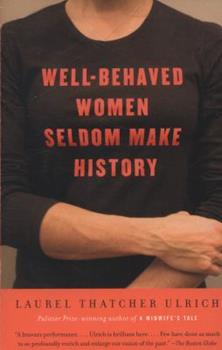“They didn’t ask to be remembered,” Pulitzer Prize-winning author Laurel Ulrich wrote in 1976 about the pious women of colonial New England. And then she added a phrase that has since gained widespread currency: “Well-behaved women seldom make history.” Today those words appear almost everywhere—on T-shirts, mugs, bumper stickers, plaques, greeting cards, and more. But what do they really mean? In this engrossing volume, Laurel Ulrich goes far beyond the slogan she inadvertently created and explores what it means to make history.
Her volume ranges over centuries and cultures, from the fifteenth-century writer Christine de Pizan, who imagined a world in which women achieved power and influence, to the writings of nineteenth-century suffragist Elizabeth Cady Stanton and twentieth-century novelist Virginia Woolf. Ulrich updates de Pizan’s Amazons with stories about women warriors from other times and places. She contrasts Woolf’s imagined story about Shakespeare’s sister with biographies of actual women who were Shakespeare’s contemporaries. She turns Stanton’s encounter with a runaway slave upside down, asking how the story would change if the slave rather than the white suffragist were at the center. She uses daybook illustrations to look at women who weren’t trying to make history, but did. Throughout, she shows how the feminist wave of the 1970s created a generation of historians who by challenging traditional accounts of both men’s and women’s histories stimulated more vibrant and better-documented accounts of the past.
Well-Behaved Women Seldom Make History celebrates a renaissance in history inspired by amateurs, activists, and professional historians. It is a tribute to history and to those who make it.

